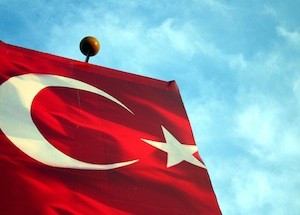TURKEY. Local elections in Turkey have passed and generated a number of question marks for expert analysis. The victory of the ruling Justice and Development Party (AKP) with 46% of the votes left its main rivals far behind. Although local elections in Turkey are traditionally not considered a landmark event in political affairs, this time the stakes were higher than before both for the AKP and its leader, PM Recep Erdogan.
The simmering political environment had been stipulated by a number of significant factors within the domestic political life of the Turkish state, prior to the local elections. This was a political test after the civil protests of last summer and the series of political scandals produced recently, which had intensified the polarization of Turkish society.
Many believed that with these anti-government sentiments reigning, it was the occasion for electoral surprises and the start of the demise of Erdogan and his party. Meanwhile the government decisions to ban Twitter and YouTube reignited dissatisfaction in Turkish society. This fact seemed to be the government’s blunder at such a crucial moment.
Even though all these all these events indicated the coming of radical changes, electoral results show that a large part of the Turkish people remained committed to the conservative style of thinking and lifestyle, reflected in their votes to AKP, which in turn, means the satisfaction by more than a half population of the conducted course of so-called moderate Islamization.
Local elections are bound to the election of metropolitan and district mayors with their council members, and village chiefs with councils in rural area. Their main mission is to be effective manager in the field. Their significance should maybe not be overstated. However, Erdogan and his party consciously did everything to make the local elections a success, reflected in the politically aimed communiqués of the high-rank authorities during the electoral campaign. The main idea of the AKP nominated candidates was to transmit the message of PM Erdogan about the fateful moment deciding the future of the Turkish state. Thus, these elections were sample test of confidence for Erdogan and his party.
So, then what? August 10, the date of presidential elections is coming up. Local elections may have given a view of what to expect, it may become the day on which Erdogan changes his PM seat for the presidential office. The nomination of Erdogan to run in the presidential race is inevitable. According to the current charter of the AKP, a member can only be elected three times in a row into the Parliament, making it impossible for Erdogan to become member of Parliament and subsequently to become PM, as it would be his fourth time.
At the same time, there are other concomitant problems. The majority of parliamentarians loyal to Erdogan in Parliament fall under the said article’s regulations. It is important to maintain support in Parliament. Undoubtedly, it is possible to adapt the charter, but that would severely affect the legitimacy of the future president and his rule. Furthermore, AKP’s main competitors cannot be written off. They are the military, which has several times overthrown the Turkish ruler, and representatives of the police and the judiciary, which are controlled by Erdogan’s main opponent, Fethullah Gullen.
It is difficult to predict the results of the future presidential elections. New scandals may see light in the course up the elections. However, the March 30 elections brought several things:
First, Erdogan is poised to take all at hand actions to win the upcoming elections, considering the high level of alleged rigging and falsifications unprecedented in modern Turkey.
Secondly, the local elections consolidated the opportunity for Erdogan to control the presidential race and the use of administrative resources.
Third, there is a Kurdish Peace and Democracy Party – BDP, which won 6.9% of the vote. Erdogan created this structure in 2008 to control the Kurdish population and to reduce the influence of the Kurdish ultranationalists. Erdogan will add these percents of the vote and will be able to monitor the elections in the southeast of Turkey.
Under such circumstances, Erdogan has trump cards in his hands. His chances to take over the presidential office have increased. However, he still may overplay his hand and the victory can still go to the other side.

